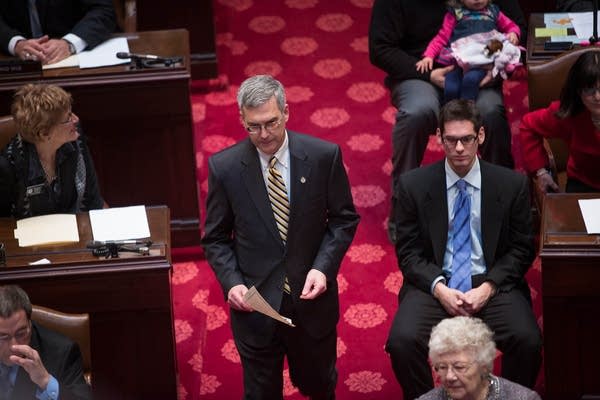GOP leader Hann disagrees with district on same-sex marriage vote

Among the many members of the Minnesota Legislature whose support or opposition to same-sex marriage puts them at odds with most voters in their districts is Republican Senate Minority Leader David Hann.
Last fall, fewer than 4 in 10 voters in Hann's Eden Prairie district cast ballots to define marriage in the state Constitution.
Still, Hann intends to vote against the bill.
"I have always supported the law that we have on the books today which defines marriage to be between one man and one woman," he said.
Create a More Connected Minnesota
MPR News is your trusted resource for the news you need. With your support, MPR News brings accessible, courageous journalism and authentic conversation to everyone - free of paywalls and barriers. Your gift makes a difference.
MORE MARRIAGE VOTE COVERAGE
• Maps: Same-sex marriage votes compared
• Today's Question: Time to redefine marriage?
• Live blog: Recap of live blog coverage of House vote
• Story: DFLer in trouble over vote
• Interactive: Deep roots of the marriage debate
• Special report: How the amendment was defeated
Outside the Eden Prairie Library, several of Hann's constituents say their wishes, not Hann's personal beliefs, should drive his vote on same-sex marriage.
Stacey MacKay of Eden Prairie said last fall's defeat of the proposed amendment to define marriage in the state Constitution amounted to a vote in favor of allowing same-sex marriage.
"I think that's fair to say," MacKay said. Because a majority of Hann's constituents voted against the amendment, MacKay said Hann should vote to allow same-sex marriage.

"They have to respect the fact that Minnesotans are pretty well-versed in this and they should be representing those people," MacKay said.
Dave Reidy, also of Eden Prairie, supports same-sex marriage and agreed with MacKay that Hann should vote for it.
"I think he should vote with the will of the people," Reidy said.
One of the House members from Hann's area, Rep. Jenifer Loon, R-Eden Prairie, voted for the same-sex marriage bill last week.
Hann said it is a mistake to equate the defeat of the proposed constitutional amendment with support for changing the state law.
"I talked to a lot of people who didn't support the amendment," Hann said. "Many of them said we didn't need to have the amendment because we had a law, and that's why we shouldn't vote for the marriage amendment."
Statewide, the amendment failed last year with about 51 percent voting no and 48 percent voting yes. But in some legislative districts there was more support or opposition than in the state as a whole. That means there will likely be political repercussions for lawmakers who vote against the will of their districts on same-sex marriage.
Outside the library, Ellen Olson of Eden Prairie alluded to the tough situation that lawmakers like Hann face.
"Oh dear, that's hard for him politically," Olson said.

However, University of Minnesota political science professor Kathryn Pearson said just because a lawmaker votes in opposition to the apparent majority position on same-sex marriage does not mean the lawmaker's political future is in jeopardy.
Some lawmakers may even attract new support for taking a principled stand despite the political risk, Pearson said.
"So many times voters are frustrated because they see legislators who don't vote their conscience and just follow the fray, or they potentially think, follow the money," Pearson said. "And in this case, if legislators are able to explain that they followed their conscience, gave a lot of thought to this issue, it could really go a long way even in deeply divided districts."
Some of the biggest political problems might have nothing to do with general elections, Pearson said, but instead could present themselves in the form of primary challengers to Republicans who vote in favor of same-sex marriage.
But given how quickly sentiment over same-sex marriage has been changing, it is difficult to tell where voters and politicians will be on the issue even as early as next year, Pearson said.
"This is a quickly evolving issue and not just among Democrats," Pearson said. "Democrats have obviously come on board with same-sex marriage much more quickly than Republicans, but we are seeing a lot of Republicans -- fewer at the elected level -- but a lot of Republicans who are involved in GOP politics come out in support of same-sex marriage.
"And then if you look at generational divides, the overwhelming majority of young people of both parties support same-sex marriage."
Just like last week when the same-sex marriage bill came to the House floor for debate, supporters and opponents are expected to flock to the Capitol today for the Senate debate and vote.
